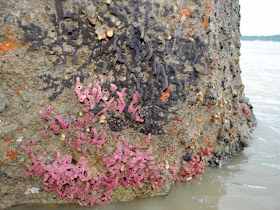
I haven't been to this stretch for more than a year! How has it been?
This shore has previously been "improved" with sand and sometimes dredging takes place in the vicinity. There were no works during our trip and the marine life seems to be recovering.

Though the tide wasn't very very low, we could still see lots of encrusting animals on the rocks such as the colourful sponges.

This reddish sponge is the Lumpy pink sponge (Haliclona cf. baeri). They are not as common as the Purple branching sponges (Callyspongia sp.).

The purple branching sponges are most abundant on the rocky shore. They seem to thrive well despite the murky waters.

Today, I was overdosed with lots of cowries! These are probably the Ovum cowries (Cypraea ovum).

And I seldom see so many Hoof-shield limpets (Scutus sp.) on a single trip itself. They are quite commonly sighted underneath rocks. The whitish and blackish ones are probably of different species. The black one should be Scutus unguis.

It was a treat to find some of the beautiful Sea fans (Order Gorgonacea). The majority of them should be living deeper in the murky waters.

Unfortunately, they were also quite a number of washed up sea fans. The red one seems to be entangled by some lines. I tried to free it from entanglement and planted it back into the rocky shore, hoping they will make it!

An interesting sighting while checking the underneath of rocks will be this Sea toad spider crab (Schizophrys sp.). They have long pointed heads and skinny legs and are masters of camouflage.

After searching high and low, I finally came across this lone Blue-spotted flatworm (Pseudoceros indicus). These flatworms used to be much more common in the past, could it be a seasonal thing?

On the higher shore, there are quite a number of pretty nerites.

Sea stars wise, I only came across three of them. Weirdly, no Crown sea star (Asterina coronata) though Ria saw one. It was still a good consolation to see this gigantic Biscuit sea star (Gonodiscaster scaber).

Rene found another Biscuit sea star that is smaller in size.

And thanks to her again, I get to see this Cake sea star (Anthenea aspera). It is quite pretty with greenish tinge on its body.
Echinoderm wise, Rene also came across two Pencil sea urchins (Prionocidaris sp.)!

There were quite a number of sea cucumbers such as this purple sea cucumber.

On the left is the Thorny sea cucumber (Colochirus quadrangularis) and the cucumber on the right is the Pink warty sea cucumber (Cercodemas anceps). On our shores, the thorny sea cucumbers are usually much more abundant than the latter.

In addition, I came across a couple of these ball sea cucumbers (Phyllophorus sp.).

I was quite surprised to see this Garlic bread sea cucumber (Holothuria scabra). This is because there were many people harvesting seafood on the shore during the trip and this is an edible species.

The Haddon's carpet anemones (Stichodactyla haddoni) are doing quite alright with relatively good numbers of them on the shore.

There were also a couple of these Swimming anemones (Boloceroides mcmurrichi) on the seagrassy habitat.

On the green Sea fan seaweeds (Avrainvillea sp.), there were some egg ribbons of what looks like nudibranch egg ribbons. I did not see the tiny 'Strawberry slugs' (Costasiella sp.) that infest these seaweeds though.

Once again like the ubin trip, I come saw a nudi sighting right at the end of the trip. This is the Rose nudibranch (Dendrodoris fumata)!
I sprained my foot while maneuvering on the rocks.... :( Hope it recovers soon. Not too sure if I can go on this evening's trip later.
More photos of the trip here: http://www.flickr.com/photos/koksheng/archives/date-taken/2010/12/22/
Garlic bread sea cucumber? Awesome!
ReplyDeleteHi! can i ask for help po? i'm not sure of the classification of my marine sponges samples... il email it nalang f u don't mind..tnx po... or visit my blogspot. http://jbsablaon.blogspot.com/ tnx po..
ReplyDeleteHi, you may want to use the wildfact sheets for id of sponges. http://www.wildsingapore.com/wildfacts/porifera/porifera.htm
ReplyDelete